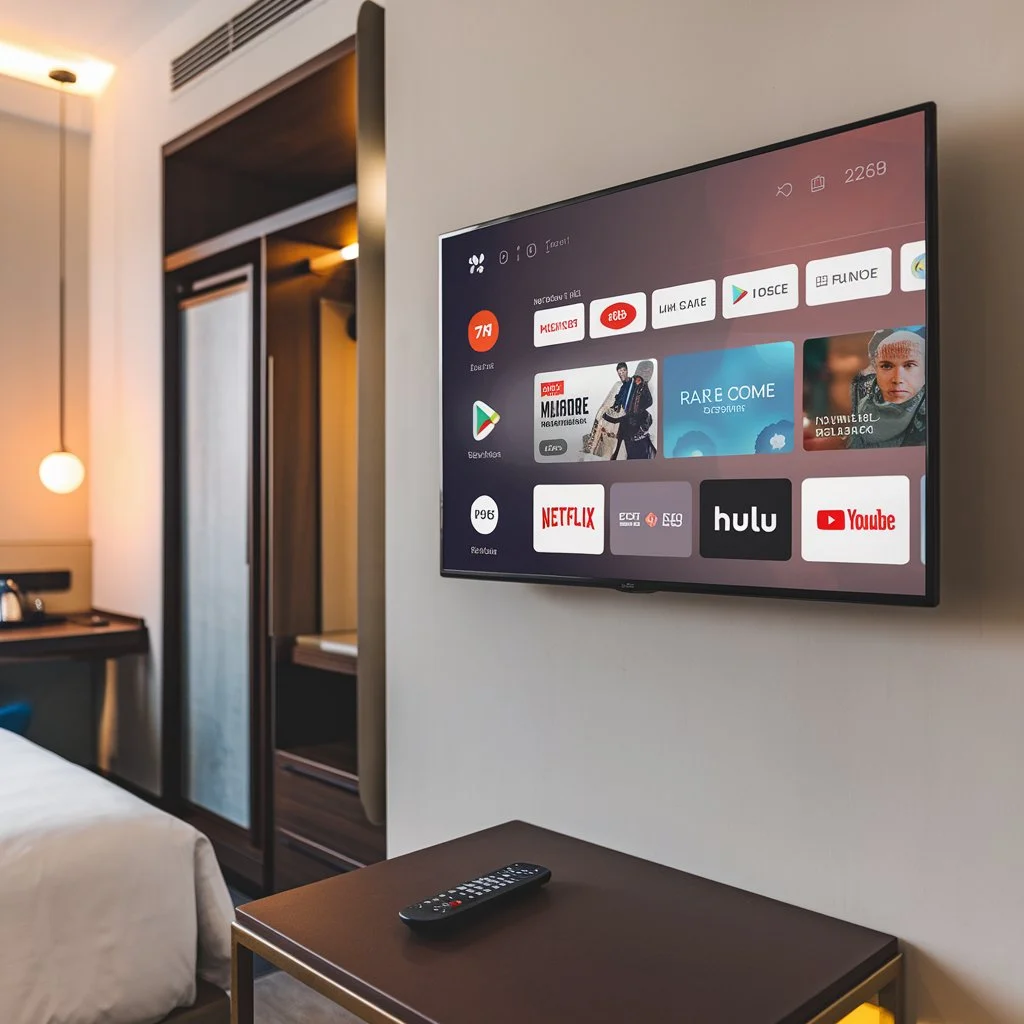What is Hospitality Technology? Definition of Hospitality Technology Hospitality technology relates to the various hardware, tools, and systems
What is Hospitality Technology?
Definition of Hospitality Technology
Hospitality technology relates to the various hardware, tools, and systems used in the hospitality industry to enhance service delivery, ensure streamlined operations, and even assist in the guest experience. This technology is critical nowadays as it enables guests to be served as efficiently and comfortably as possible. For instance, this technology includes the ease of booking a room over the Internet and checking into a hotel using a mobile phone, making traveling and even staying in the hotels easier.

Role of Technology in Hospitality
Technology in the hospitality sector helps these businesses keep their customers comfortable. It simplifies such tasks and processes as booking a room, checking in, or even asking for room service. For instance, guests need not get stuck in a queue waiting to check in at a hotel as guests can perform this action using an app on their phones. This benefits the guests and helps lessen the burden that guests have on the hotel staff.
Critical Trends in Hospitality Technology
Hospitality Digital Transformation
Digital transformation means changing everyday practices in, for example, hotels and restaurants through innovation. Nowadays, instead of utilizing paper and interacting with people, bookings or invasions have been computerized using a computer, cell phone, and the Internet to organize bookings and even feedback from people. This transformation has made it easy for the business to serve guests promptly and efficiently.
Automation in Hospitality Services
This definition of hospitality focuses on automating processes within the hospitality environment that humans typically do. For instance, a few hotels will feature a self-service check-in kiosk as part of their services. Waiting times are reduced, and the guests’ overall experience is made more effortless. It also allows the employees to pay attention to other more relevant issues, such as guests with particular needs.
Cloud Computing for Hospitality
Using the Cloud, hotels and restaurants do not have to keep the information or run the programs on their computers. Instead, they can use the net. This allows one to retrieve or find the data needed in whichever location or at any time. Cloud computing is critical for the hospitality industry since it enables them to coordinate bookings, employee activity schedules, and much more under the same platform.
Internet of Things (IoT) in Hospitality
The Internet of Things is simply a system formed by many objects that can interact with each other through the Internet. The IoT in hospitality utilizes bright rooms where guests can adjust the lighting, room temperature, and television control over a smartphone. This has made enhancing the guests’ comfort easier by making their experience more tailored.
Benefits of Hospitality Technology
Enhancing Guest Experience
Undoubtedly, implementing technology in hospitality to satisfy all guests is crucial. Many providers offer mobile check-ins so guests do not need to do not need to ng queue. Also, intelligent rooms allow guests to tweak the room’s environment to suit them. All these once more point to a simple fact: technology application positively impacts the overall guest experience, which in turn can translate into better guest retention.
Increasing Operational Efficiency
The use of technology in hospitality makes the operations of the organizations more efficient. Most responsibilities, such as booking appointments or scheduling cleaning duties, have been delegated to computerized systems, leaving human personnel to do the essential tasks. This minimizes the chances of making mistakes and helps in saving precious resources.
Improving Customer Service
More specifically, technology makes it easier for restaurants and hotels to interact with their customers. For example, guests can still ask questions on a website with a chatbot even if no employees are on-site at that moment, and these questions will be answered immediately. Thus, assisting clients at any time is possible, enhancing the service.
Real-Time Data Insights and Analytics
Data provided to organizations in real-time directs them on how best to operate within the hospitality industry. By evaluating reviews, reservation counts, and employee feedback, hotels can mitigate shortfalls. Wearing analytics hats enables these businesses to identify such patterns and develop suitable strategies to elevate guest satisfaction.
Hospitality Software Solutions
Property Management Systems (PMS) in Hotels
In simple terms, a Property Management System is referred to as PMS and is used for managing hotel rooms, guests, and hotel employees. It does this by being responsible for bookings, check-ins, and payments made for stays. A reliable PMS allows the hotel staff to consolidate all the tasks on a single platform.
Hotel Booking and Reservation Systems
Hotel booking systems provide guests with an option to book their rooms online. The importance of these systems is that they allow the guests to book a stay without geographical boundaries, regardless of the time of day. Hotels implement these systems to manage the occupancy of their rooms so that all operations are seamless.
Revenue Management Software
This software in the hotel is used to optimize revenue yield by searching for the best rates for the rooms. It uses data on a number of room bookings and bookings depending on different seasons. This means that hotels can maximize their income without disappointing guests by making such changes in how a commodity is charged.
Customer Relationship Management (CRM) in Hospitality
CRM helps hotels suggest good services to guests based on recorded feedback and information on preferences. Recording their preferred amenities and eating habits is helpful as some customers appreciate different areas of the hotels. For example, if a guest is particularly fond of a particular room, the hotel can help the guest get that type of room each time he visits the place.
Guest-Facing Technologies in Hospitality
Mobile Check-In and Check-Out Systems
Mobile check-in and mobile check-out enable hotel guests to check into the hotel room or the hotel in general or even check out of the hotel room using a mobile phone. This is an excellent time-saving advantage, and ittmakescess quicker than traditional ways. The guests do not have to wait in lines, and the hotel employees do not have to attend to such routines, enabling them to perform other activities.
Smart Room Technologies
Innovative room technology lets the people in the hotel use their mobile phones or even their voices to control some essential functions like lights, temperature, and even the television set. This enables the guest to have a more enjoyable stay as they can manipulate the environment with the help of those things. It also decreases the level of contact with other people, which is very relevant nowadays when health is of concern in society.
Concierge Features on the Internet
These days, when a guest is at a hotel, he can make use of Internet concierge services, which provide help in many different areas, including making restaurant reservations, getting nearby places of interest, and –with the most ease- allowing guests to order any food without leaving the comfort of the room. Since these services are available on mobile phones or hotel applications, guests hardly need to step out of their hotel rooms.
Self-Service Kiosks in Hotels
Self-five” kiosks are those self-service menu boards available in most hotels where guests control the processes of checking in, going out, and placing orders for services without anyone attending to them. There are such stations in most of the modern hotels. It helps speed up everything and minimizes the queuing time; hence, it is free and more comfortable for the guests.
Innovations in Hospitality Sector
Artificial Intelligence (AI) in the Hospitality Industry
Today, artificial intelligence has found application in the hospitality industry to make service more intelligent and lower the time taken per guest. For example, if a particular guest is visiting for the second time, AI may identify their needs and offer items before they ask for them. The use of AI in hospitality is also aimed at enhancing guest satisfaction through service delivery.
Virtual Reality (VR) Applications in The Industry
Some hotels apply Virtual Reality (VR) to allow guests a virtual tour of the property before booking. This is beneficial because it gives guests a better picture of the hotel and the level of service offered in that particular hotel. VR can also be used to entertain guests during their stay, and guests are provided virtual tours of nearby sites.
Application of Blockchain Technology in Hospitality Payments
Payments and guest information are stored using blockchain technology in the hospitality industry. This is because the data is recorded in a manner that is hard to alter or hack any transaction. This is especially important in hospitality, where the guests’ private detailsmandils are assured of security.
Chatbots and Automation in Hotel Customer Service
A chatbot is a computer program designed to interact with guests via chat interactions on the Internet. A bot can respond to queries, take offers, assist in resolving issues and other tasks. Customer service in such cases is improved by providing speedy and efficient assistance as and when customers require it but cannot attain it due to staff members being occupied or out on other duties.

The Role of Mobile Apps in Hospitality
Functionalities of Hotel Mobile Apps for the Benefit of the Guests
Mobile devices have applications developed for individuals staying in hotels, enabling them to make bookings, check in, order services, and open their rooms when they reach the hotels. Such applications create an excellent relationship and communication between the hotel and the customer since the customer can secure the services within a short time and with less difficulty.
Mobile Payment Options in Hospitality
Mobile payment features let the visitors of a particular hotel settle their accounts or be charged for the services offered in the establishment using their mobile devices. It is quick and easy! And eliminates the need to deal with cash and credit cards. Hotels and restaurants are opening up to accept mobile payments more frequently.
Loyalty Programs and Mobile Integration
Some of the hotels incorporate mobile apps to run loyalty programs. Guests earn points, redeem rewards, and check for them on their phones. This is essential in ensuring that guests do not lose faith in committing themselves to a particular hotel chain.
Transformational Experiences Offered by The Use of Mobile Technology
No-Touch Technology This is for the hotel, where the client doesn’t have to touch anything to interact with the hotel. In this case, guests simply check themselves in using their mobile phones, use the digital key, and make payments via their mobile phones. These alternatives have improved the level of safety and convenience that a guest can experience within the hotel’s premises.
Cloud-Based B2b Hotel Software
Cloud-Based Hotel Management Systems: Introduction
This is where a hotel management system, which is a software application hosted over the Internet and used by hotels to manage everything from bookings and staff schedules to guest services and more, is effective for a Hotel. A lot of warrants are coming in to further the evo of all_info Management deployment – centralized management so that there is only one way to access info.
Cloud Computing Benefits in the Hospitality Sector
Preserving the lifespan of expensive hardware and software is very important in the hotel industry, and that’s how cloud management is assisted. Furthermore, they help keep everything up to date and minimize minimize the chances of everything going wrong.
Cloud Platforms for Seamless Communication
Connectivity, regardless of the location of the staff, allows effective communication throughout the work, switching different job roles and tasks. Housekeeping, front desk, working with management, and everyone has access to the same info in real time, thus increasing management effectiveness.
Information Protection in Technologies for Hospitality Management
Internet Security Threats Confronting the Hospitality Sector
Since the hospitality business deals purely with personal and payment data, hackers have adopted them as hackable industries since they are highly populated with such information. It is essential to have strict policies and high-level security mechanisms to prevent such attacks as hotels strive to protect their customer’s information.
GDPR Compliance for Hotels
In essence, GDPR is legislation designed to protect the privacy of individuals, their data, and personal information. Hotels have to comply with the rules laid out under GDPR to protect the privacy of the guest data. This covers how they handle guest data regarding storage, usage, and even sharing.
How Effective Data Security Can Help in Protecting Guest Information
People in the hospitality industry understand that there is sensitive information about their guests. Such reasons compel them to enforce various preventative and punitive actions against data breaches. Hotel employees use data concentration and multiple channels to secure guest data.
Usage of Renewable Energy Resources in Hospitality
Energy Management Systems in Hotels
Energy management systems assist in standby energy reduction on the part of hotels through the self-reduction of lighting, heating, and other processes. This helps in money cuts and omits the negative effect of the hotel on the environment.
Environmental Management for Travel & Tourism ICT Sector
There are many hotels with waste-reducing technology going green and even looking for zero energy vexing concept. This includes the use of solar energy, use of water-saving devices, and providing recycling facilities.
Smart Energy Management Systems in Hotels
Effective energy management ensures durability in hotel operations, and this is where intelligent energy systems come in. Technology makes it possible to control and monitor the energy used by the hotels, leading, to green operations since they minimize greenhouse gas emissions.
Technology in the Hospitality Industry
Guest Personalisation Thanks to AI
There is no doubt that in the future, AI will be employed even more to enhance the personalization of the experience. Hotels will understand their guest’s needs and attendee even before the guest thinks of making the request.
Predictive Analytics in Hospitality
Predictive analytics is a form of analytics that uses data to make predictions and inform decisions. In hospitality, such analytics will work in terms of ‘prediction’ when it is best to make bookings or what services the guests would most likely take up. This helps bring preparedness to the hotels and offer more efficient services.
Innovations Transforming the Future of Hospitality Technology
There is always new technology coming into the hospitality industry. From AI to IoT, the future of hospitality technology will forever enhance the operations of hotels and restaurants to be more efficient and friendly to customers.

COMMENTS